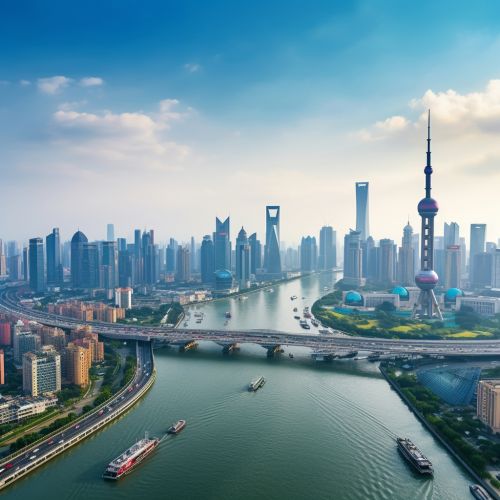Economy of Shanghai
Overview
Shanghai, the most populous city in China and one of the most populous cities in the world, has a complex and diverse economy. As a global financial hub and one of the world's busiest container ports, Shanghai's economy is characterized by its large industrial sector, burgeoning service industry, and rapidly growing tech sector. The city's economic development is driven by a combination of factors, including its strategic location, extensive infrastructure, and government policies.


History
Shanghai's economic history is marked by periods of rapid growth and transformation. From its origins as a small fishing village, Shanghai has evolved into a major global economic powerhouse. The city's economic development has been shaped by a number of historical events, including the opening of the port to foreign trade in the mid-19th century, the establishment of foreign concessions, and the economic reforms of the late 20th century.
Sectors
Industry
Shanghai's industrial sector is diverse and well-developed, encompassing a wide range of industries such as shipbuilding, automobile manufacturing, petrochemicals, steelmaking, and electronics. The city is home to a number of industrial zones, including the Shanghai Industrial Investment Corporation (SIIC) and the Shanghai Free-Trade Zone.
Services
The service sector in Shanghai has seen significant growth in recent years, driven by the expansion of financial services, real estate, retail, and tourism. The city is a major global financial hub, hosting the Shanghai Stock Exchange and numerous multinational corporations.
Technology
Shanghai's tech sector is rapidly expanding, with a focus on areas such as artificial intelligence, biotechnology, and information technology. The city is home to a number of tech parks and innovation hubs, including the Zhangjiang Hi-Tech Park and the Shanghai Tech Park.
Infrastructure
Shanghai's extensive infrastructure plays a crucial role in supporting its economy. The city's transport network includes one of the world's busiest container ports, an extensive metro system, and two international airports. Shanghai's digital infrastructure is also highly developed, with widespread internet access and a growing focus on smart city technologies.
Government Policies
The Chinese government has implemented a number of policies aimed at promoting economic growth and development in Shanghai. These include the establishment of the Shanghai Free-Trade Zone, the promotion of innovation and entrepreneurship, and the implementation of measures to attract foreign investment.
Challenges and Opportunities
Despite its economic success, Shanghai faces a number of challenges, including environmental issues, income inequality, and the need for further economic diversification. However, the city also has numerous opportunities for future growth, including the ongoing development of its tech sector, the expansion of its service industry, and the potential for increased international trade.
